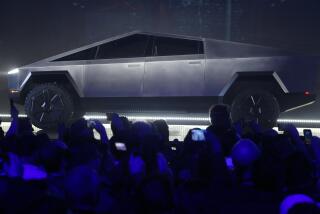SCIENCE / TECHNOLOGY : UC Irvine Hopes New Supercomputer Will Draw Top Scientists
- Share via
Hoping to boost its reputation as a leading research institution and to attract and retain top scientists, UC Irvine has purchased a high-powered supercomputer for campus researchers.
The $2.3-million computer will be used for about 50 campus research projects and will be available to hundreds of UC Irvine researchers, officials said.
“UCI’s computing strategy is to provide a full range of computing resources for the needs of all users,” said William Parker, UCI’s associate executive vice chancellor and acting director of academic computing. “Our challenge is to continue to attract the finest faculty and students by providing the best possible environment for research.”
The supercomputer is many times more powerful than current computing facilities available at the university. In the past, UC Irvine researchers have used a national supercomputer center in San Diego, which is shared by numerous universities and other research institutions. However, access to the San Diego center is limited.
Supercomputers are the fastest category of computers and are more powerful than the largest mainframe computers. They typically are used for complex tasks that require heavy computing power, such as simulating weather patterns or modeling the movements of a subatomic particle.
The machine purchased by UC Irvine is made by Dallas-based Convex Computer Corp. The computer, called the Convex C240, has 1 gigabyte of memory, or the capacity to store about 1 billion characters. That is about 1,000 times the memory of the average Apple Macintosh.
Donna Burke, a spokeswoman for Convex, said the company has sold supercomputers to the University of Notre Dame, Brigham Young University and the University of Illinois. But she said none is as powerful as UC Irvine’s.
“We filled what was a major gap in the resources available to our faculty,” said Stephen D. Franklin, UC Irvine’s coordinator for academic computing. “We have one of the largest systems, in terms of available memory, of any university in the country.”
“It will enable our faculty, which before essentially had the computer equivalent of a car, to now have a plane,” he said.
Universities are buying powerful computers to lure more talented scientists to their campuses, Franklin said. Although UC Irvine has access to the national computer centers, “one of the raps against us is that (the centers) are still not enough. You have to have your own (supercomputer). In trying to train and attract the faculty we want, this is sometimes as important as having a decent laboratory.
“The faculty in certain departments pushed for this and made the case . . . that our retention, recruitment and status as a major public research university required providing, on campus, a capability far in excess of what we previously had.
“I have been told by those involved in recruiting, the deans in engineering and the physical sciences, that there were situations where our lack of computational capability meant we weren’t in the ballpark with certain (job) candidates,” Franklin said.
More to Read
Inside the business of entertainment
The Wide Shot brings you news, analysis and insights on everything from streaming wars to production — and what it all means for the future.
You may occasionally receive promotional content from the Los Angeles Times.










